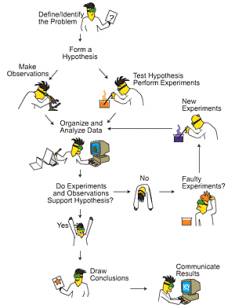|
from The Worldview Literacy Book copyright 2009 back to worldview theme #6 |
|
Discussion Science begins with intellectual
curiosity: someone is puzzled by something they observe and decides to
investigate. The related
quest for knowledge can run into obstacles and lead to specific
problems. Some define science as a body of knowledge ultimately
founded on observation; other definitions stress the method by which
this knowledge is gathered and problems are solved.
Others, looking at the big picture, define science as a
methodical effort to provide a map or conceptual framework for
understanding Reality. While the scientific method has been
characterized as humankind's greatest invention, in truth there is no
universally agreed on way that scientific investigation proceeds.
Obviously not all scientists do things the same way.
The order in which certain component parts of the scientific
method can vary with its application. Experimental scientists do things
differently from theoretical scientists—or from those working in branches of science where experiments aren't
possible (astronomy for example). But
generally all science involves what is described in the opening sentence
of the above worldview theme. And
feedback plays a key role in implementation of the scientific method.
(See Figure #6a.) To
illustrate, imagine the following. An experiment is conducted—which means the
scientist interferes with nature and creates conditions or events that
favor making a particular observation or establishing a particular
hypothesis. The results of
this experiment are compared with the results expected (or predicted)
based on the hypothesis—this is the "testing" part of the
method. If the fit between
the actual and predicted results is a good one—as judged by
statistical tests—then the hypothesis is accepted.
If the fit is not good, the hypothesis and/or experiment will be
modified, and the testing will be repeated.
The scientific investigator(s) may spend months, even years,
stuck in this feedback loop part of the scientific method—forming new
hypotheses, gathering data, testing, etc. only to emerge from it with a
hypothesis that demonstratively fits the data.
Eventually they will publish their findings for others to
verify—and provide more feedback: "Yes, we can reproduce your
results!" or "No, you guys failed to control X.
When we do that we find that your hypothesis is not
established!" or whatever. In short, the feedback built into the scientific method
serves as a self-correcting mechanism that weeds out findings based on
shoddy experimental design, questionable observations, someone's wishful
thinking, fraud or whatever, and prevents the faulty conclusions of such
flawed work from becoming part of
the body of scientific knowledge.
Science itself—this body of knowledge and the framework it fits
into—is tentative. Many
years ago Judge William Overton, in an Arkansas case pitting teaching
evolution vs. teaching creationism, made the distinction between science
and religion. He wrote, "A scientific theory must be tentative and
always |
Discussion—continued subject
to revision or abandonment in light of facts that are inconsistent with,
or falsify the theory. A
theory that is, by its own terms, dogmatic, absolutist and never subject
to revision is not a scientific theory."
Science is dynamic, ideally evolving so that the fit between its
description of Reality and Reality itself, as gauged by predictions it
makes, steadily improves.
Some trace the beginning of science to
Greeks such as Thales (6th century BCE) who believed in
a orderly universe: there is an order and organization to the universe due to
its functioning in accordance with a small number of natural laws
—laws which can conceivably be uncovered and understood by humans. Many place the threshold of modern science at the year
1600. Some even trace its
development in the struggle of one man—Johann Kepler (1571-1630)—to
turn his back on pseudoscience / mysticism and embrace the scientific
method. Kepler eventually did just that in using observed positions of
the planet Mars (made by Tycho Brahe) to confirm Copernicus' hypothesis
Mars orbits the Sun. He
refined this to give Mars an elliptical rather than circular orbit. Copernicus,
Tycho, Kepler, and of course Galileo were among those Issac Newton
(1642-1727) credited when he said, "If I have seen farther than
others, it was by standing on the shoulders of giants."
Newton is generally thought of as the father of modern physical
science. The so called
classical physics laid down in his 1687 book Mathematical Principles
of Physics survived unchallenged for two centuries.
Only in the first two decades of the twentieth century was its
absolute picture of space & time, and deterministic treatment of
physical events replaced by the theory of relativity and quantum
mechanics, respectively. Relativity, worked out by Einstein in 1905-1915, is needed
to understand the motion of objects moving at speeds comparable to that
of light or in strong gravitational fields.
It has been confirmed by nearly a century of physicists'
experimental testing to a high degree of precision.
So too has quantum mechanics, despite Einstein's dislike of its
probabilistic nature and belief that it would soon be replaced by a
deterministic theory.
Conceivably, in the future the scientific conceptual framework
may change to incorporate certain (poorly observed, paranormal, etc.)
phenomena that currently don't fit.
This will only happen if testable hypotheses can be formulated
and verified beyond doubt. Science
will also advance as its tools and instrumentation improve,
uncertainties (which always exist, there are no perfect measurements!)
in measured quantities become smaller, and a finer probing of Reality
becomes possible. Of course
there are limits: both relativity and quantum mechanics suggest some.
More fundamentally the conceptual map science provides will never
perfectly describe Reality nor what it is like for those experiencing
Reality. It will always be a step removed from Reality and therefore
fall short! |
|
Figure #6a The Scientific Method
|
Figure
#6b The Relevance of Science
|
